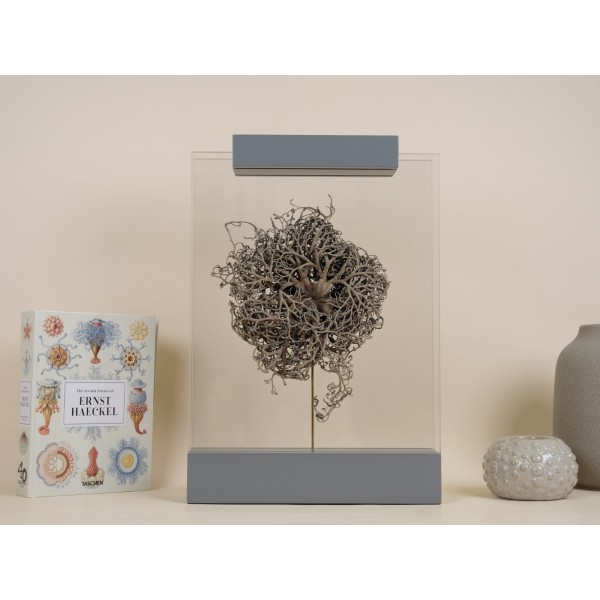Sponge sp.
Fantastic deep water Sponge species. A deep water hard sponge, very peculiar resemble Turbinaria coral.
Mounted in a black lacquered wood base, from Tulear, Madagascar waters.
| close |
This shop uses cookies to improve your experience on our website. |
Reference: N538 / Unique Piece
Gorgonocephalus - Astrospartus mediterraneus, a fantastic deep sea starfish, in a new design vitrine with grey lacquered wood base.
This one is taken from a deep of 90 meters of Capo Vado, Savona Italy. It is necessary a special technique to dry and to keep it in a perfect shape, turning it a highly decorative and curious species. Sometimes they are attached to sponges and deep water corals.
This species habits until deeps of 800-900 meters.
A One of a Kind handmade piece.
Dimensions: 43,5 cm x 30 cm x 8 cm
Weight: 3,7 Kg

Gorgonocephalus - Astrospartus mediterraneus, a fantastic deep sea starfish, in a new design vitrine with grey lacquered wood base.
This one is taken from a deep of 90 meters of Capo Vado, Savona Italy. It is necessary a special technique to dry and to keep it in a perfect shape, turning it a highly decorative and curious species. Sometimes they are attached to sponges and deep water corals.
This species habits until deeps of 800-900 meters.
A One of a Kind handmade piece.
Fantastic deep water Sponge species. A deep water hard sponge, very peculiar resemble Turbinaria coral.
Mounted in a black lacquered wood base, from Tulear, Madagascar waters.
A great Charonia variegata from Brazil, big size, perfect pattern, seldom seen like this.
Displayed in a natural brown wood base.
Giant Barrel Sponge (Xestospongia testudinaria) is a giant species of sponge found in the Indo-Pacific coral reefs. It commonly occurs at depths ranging from over 10 meters to 120 meters and can grow up to a diameter of 1.8 meters. The sponge typically exhibits a brownish-red to brownish-gray coloration, with a hard or stony texture. Due to its impressive size and estimated lifespan of hundreds to possibly thousands of years, the giant barrel sponge has earned the nickname "redwood of the reef." It displays a variable form, often appearing as a large, firm, barrel-shaped structure with a cone-shaped cavity at the top called the osculum. These sponges make beautiful decorative pieces. The specimen in question originates from Luzon, Philippines.
A beautiful glass dome with 7 Epitonium scalare and a few small corals.
Epitonium scalare is a classic elusive species, from Philippines.
Festilyria festiva from Somalia. A classic rarity, for the serious collector of for decoration as its a very colorful shell, mounted in a black lacquered wood base.
Superb pair of Hexaplex cichoreus from Balicasag, Philippines.
This intricated species is very variable in pattern and color, along the years we have had exceptional pieces, these ones are of great beauty.
Mounted in a black lacquered wood base.
This stunning Victorian-style table tray features two large valves of Pecten subnodosus, a species of scallop commonly known as the Giant Lion's Paw. Native to the Pacific and Gulf of California coasts of the Baja California Peninsula, Mexico, extending southward to the western coast of Peru. These specimens originate from Baja California, USA. This species is edible.
Mounted in a Victorian style with one Carnelian cabochon and four Amethyst cabochons, all set in a handmade dark brass base.
Four Spondylus imperialis in a black wood glass frame.
Beautiful specimen collected by divers in 20 m deep of Jetafe, Bohol Isl. - Philippines
An exceptional specimen of pinna nobilis, from Greece, in a black lacquered wood frame .
The specimen came from a old collection, today is impossible to get this size specimen.
One of a Kind decor piece!
Maoricardium pseudolima (commonly known as the Giant African Cockle) – This highly sought-after and edible mollusk is now overfished, with large specimens becoming increasingly rare. This particular piece comes from a batch collected over 30 years ago in the coastal waters north of Mombasa, Kenya.
The Giant African Cockle, with its large size and vibrant coloring, thrives buried in coral sand bottoms in the western Indian Ocean. In addition to its striking appearance, the meat of this mollusk is known for making a substantial and flavorful meal.
Alfonso Sea urchin and White Knobbly Sea urchins tower in brown granite base.
From Madagascar, a different decor piece!
Huge size Black Gorgonian in a handmade dark brass base.
These Gorgonias feature a unique and distinctive shape, carefully collected by skilled divers from the enchanting waters of Manado, located in North Sulawesi, Indonesia.
Embrace the natural beauty of this captivating piece, as its intricate form and dark hues add a touch of allure and sophistication to any decor. Each Gorgonian serves as a testament to the mesmerizing wonders found beneath the ocean's depths, bringing a sense of tranquility and marine elegance to your space.
A beautiful Shell ball made with Cerithiidae shells, from Indonesia.
These balls are part of the Indo-Pacific cultural heritage, and from a long time tribal people use them as adornment pieces. Today they are natural and beautiful decor pieces.
Superb pair of Hexaplex cichoreus from Balicasag, Philippines.
This intricated species is very variable in pattern and color, along the years we have had exceptional pieces, these ones are of great beauty.
Mounted in a black lacquered wood base.
Sugar Sea star in a white wood glass frame.
One of the most elusive species of starfish, very big size, from Gulf of Mexico.
Beautiful marine composition, looking like big mushrooms, made with shark vertebrae and white knobbed sea urchins, all from Madagascar in a natural walnut wood base.